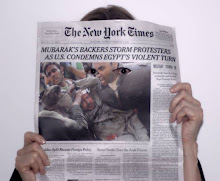I see what happened.
History is so mangled in the first 140 characters of this story that it's impossible to go on. But here it is, the lede (not the blog, the first paragraph):
- WASHINGTON -- There comes a moment in the life of almost every repressive regime when leaders -- and the military forces that have long kept them in power -- must make a choice from which there is usually no turning back: Change or start shooting.
I guess the Times is covered because it says almost. Dozens of dictators have died in their sleep in the last century, men whose lives were so evil that they call into question the existence of any god, and especially a benevolent one.
The two poster boys of totalitarianism, Hitler and Stalin, never faced a single threat from their own citizens. It's true Hitler went down in flames at the barrel of a gun, many guns, many of them in the hands of Stalin's armies, but he was not seriously challenged by the German people. Stalin, indeed, died in his sleep, secure in his grip on a vast empire. And these two murdered millions of their own citizens.
I'm not saying that there were never any dissidents. There were. And they were shot in Europe, as they were in Egypt, and the rest of the world. Jailed, tortured and killed for the slightest suspicion of opposition. The dictators always have secret police to keep such a tight lid on things that opposition on a mass scale was almost unthinkable.
The agent of change of choice in the Middle East, as well as in many parts of the world, is military coup. On occasion, it's war. Saddam Hussein was forced out by invading American soldiers.
But it's obvious that on rare occasions that people rise up, that they come out in the hundreds of thousands. That is the awesome and inspiring thing about Egypt and Tunisia and the other countries in the Mideast.
I read a lot of the paper today. This was the last thing.
When Armies Decide
Nastiness discovered on the web
Maureen Dowd revisited nastiness and anonymity on the web, using the occasion of a nasty Tweet aimed Lara Logan, the CBS correspondent who was attacked in Egypt, by a rather nonanonymous brother in journalism, Nir Rosen, who paid for his indiscretion by losing a fellowship at NYU. That's where the column starts. It continues with complaints against several people, not all exactly bloggers who operate by name.
I don't mean to be fussy, but there's a weird thing going on in the distinction between journalists and bloggers. Many news businesses have started to call reporters and columnists bloggers, probably because they think it will help them hang on to readers on the wild wild web. (The Times does and I'm sure they debate when to use the label blogger and when to stick to the old-fashioned terms.) At the same time, journalists do a fair amount of sneering at bloggers. It's unseemly.
Then, halfway through the column, Dowd mixes up those writers with some examples of anonymous insults hurled at a variety of public figures, and wraps it up by quoting a few experts. The logic here is a stretch. Perhaps she means to tie the sexist outbursts after Logan's attack to the climate of violent speech. It's a lightweight argument. But then Dowd has an attitude about the sea of web comments, especially when it's personal to her, as it was two years ago when she took a shot at anonymous critics of her work.
Today: Stars and Sewers
2009: Stung by the Perfect Sting
Are you calling Zuckerberg a thief?
Speaking of confusion, Randy Cohen in the Ethicist column in the Magazine uses the occasion of the movie The Social Network to talk about intellectual property rights. That's what the music business claims when they defend their royalties for rap music, and the movie business for T&A flicks. In a twist, intellectual property (and synonyms imaginary property and I.P.) are the terms geek businesses use to debate the value of software, but I'm struggling to see the connection he makes.
Cohen starts out by preening about how he was at an exclusive screening of the movie about Mark Zuckerberg and Facebook with the Writers Guild. Hollywood is a dirty business, he tells us, and it's ironic that Hollywood made a movie about piracy. And so the writers at the movie giggled at the pot and the kettle.
I am puzzled, however. How exactly does stealing plot lines in the movie business relate to the digital pirates who steal copies of movies? Is he quoting Abbie Hoffman, and saying, "Steal this book"? And why are we even talking about Zuckerberg? Cohen doesn't seem to think so, but the point is a bit obscure.
Hollywood Property Values

No comments:
Post a Comment